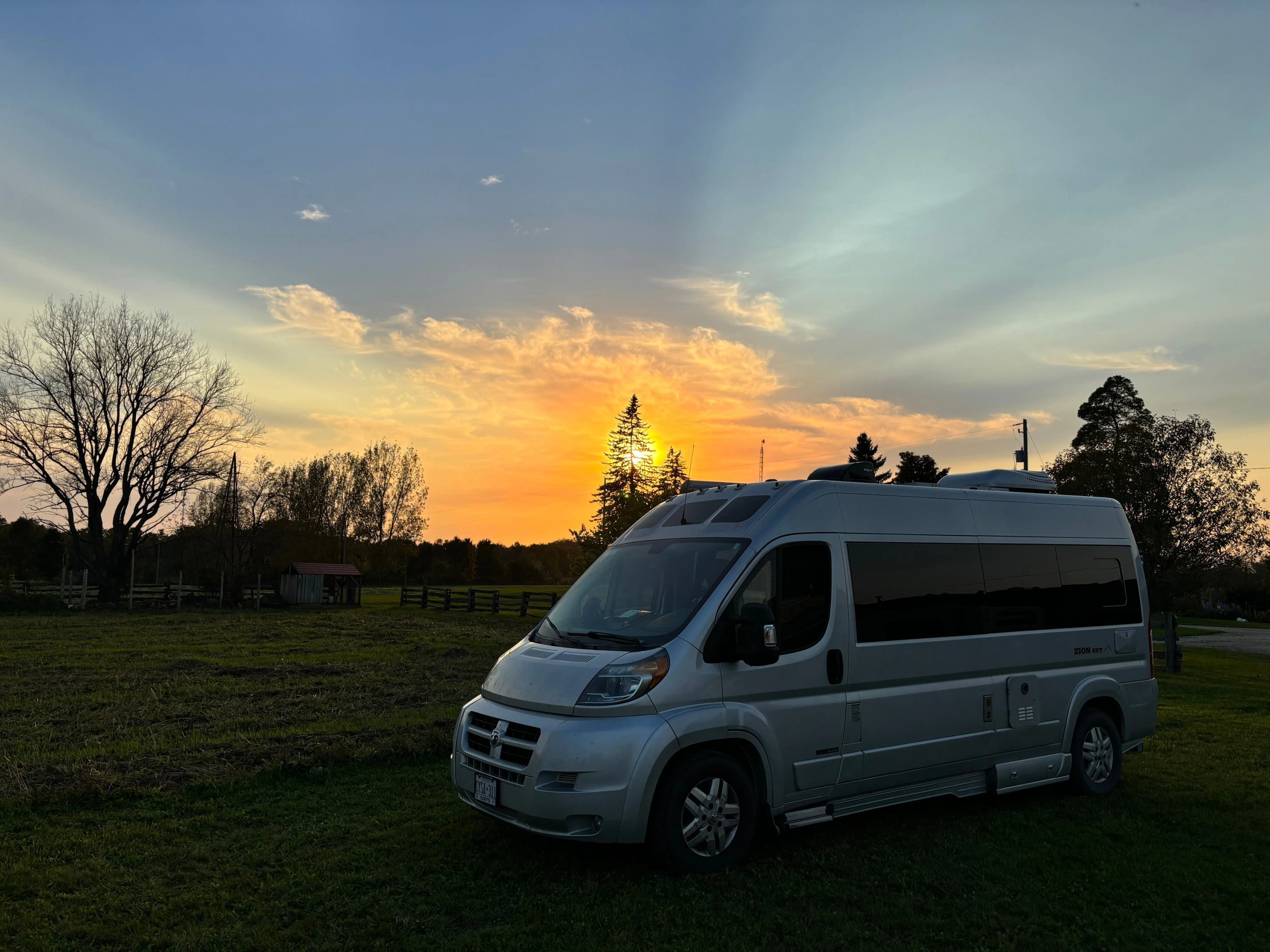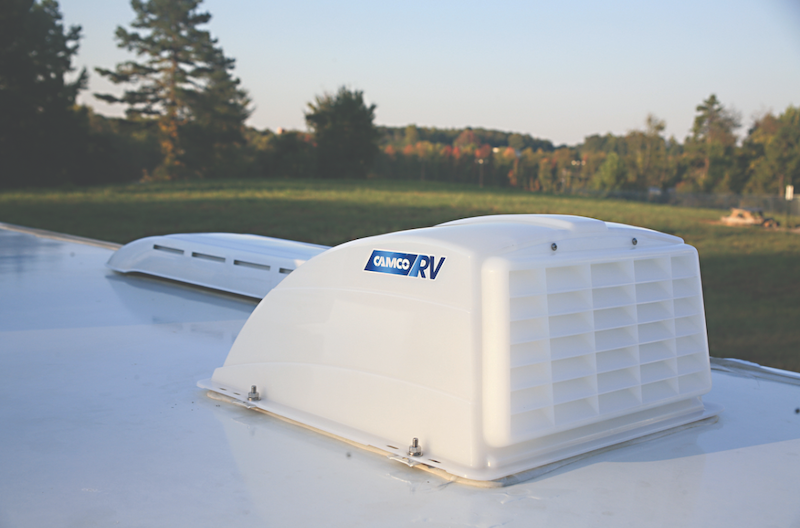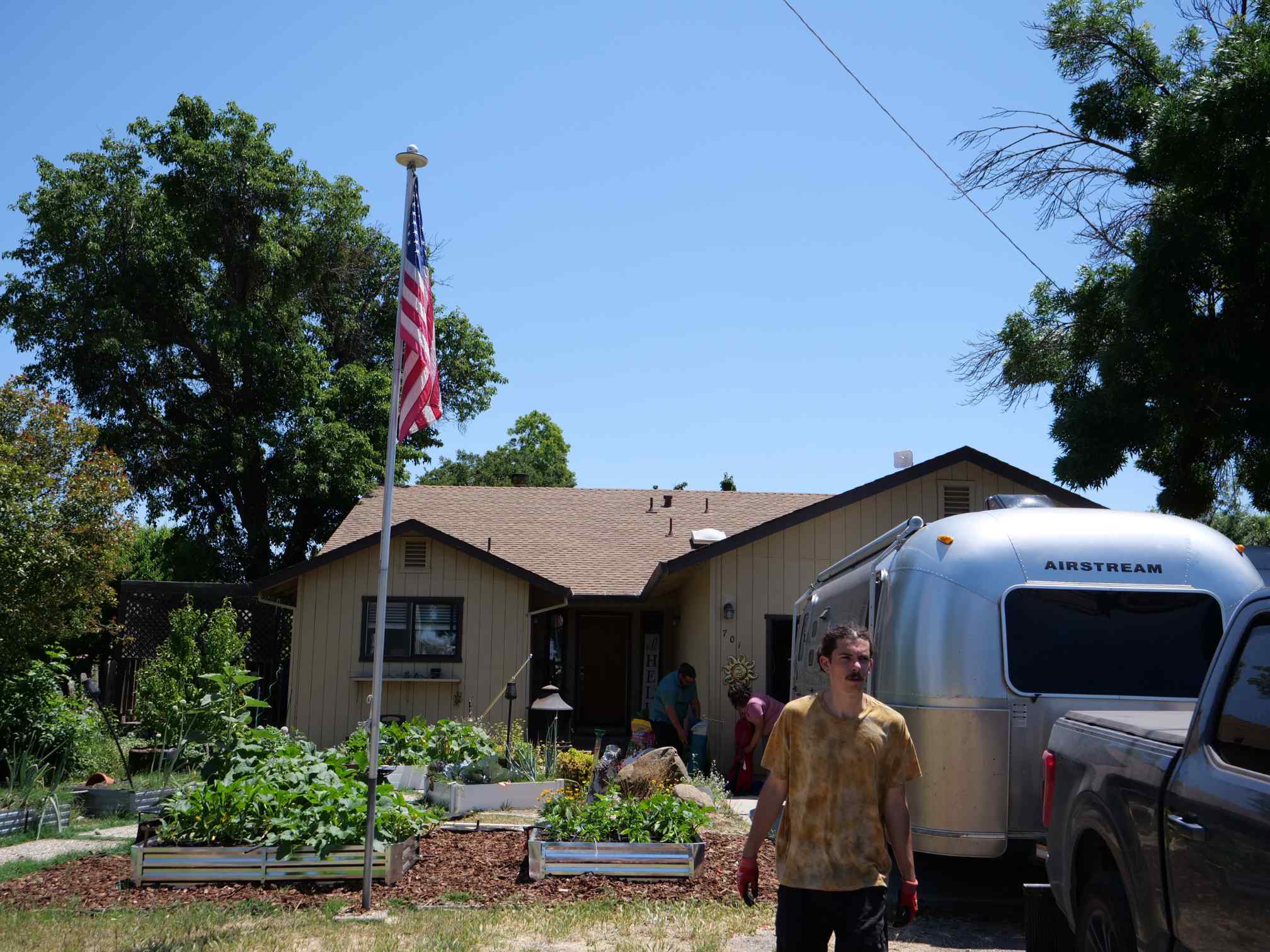Why This Full-Time RVer is Buying Land
Like so many RVers — full-timers, seasonal, and weekenders alike — my husband and I had plans for 2020. We were going off the grid. We’ve been full-time RVers for three years now, and we had “planned” to spend the year camping on public lands in two-week stints and hopping our way around the American West. We figured if we wanted to take a break from being off-the-grid, then we’d just book a month at an RV park here and there.
Of course, that all went out the window in March. Not only did over half the RV parks in the country close down in some way, but so did many of our state and federal parks, and even some of the dispersed camping on public lands on both state and federal levels.
And while coronavirus is a (hopefully) temporary crisis, it’s one that’s served as a wake-up call for us. We’ve been asking ourselves how we can be more prepared for an emergency, and how we can always be safe while also living the life we dream of. After all, we didn’t opt for this minimalist lifestyle because we’re satisfied with anything less than our dream life.
Our answer to all these questions? Land.
Why this full-time RVer is getting into land
We’re buying a few acres of land in a few different states around the country. We plan to just drive in a big circle between our properties, whenever we feel like it. We’ve built a brand-new solar system and added multiple water tanks to our utility systems to allow us to be on raw land and still have everything we need to live a pretty normal life (including a washer, dryer, and dishwasher).
So far we have three pieces of remote acreage, two of which we’ve purchased since the pandemic began, and we’re picking up more. Sometimes “remote” means it’s half an hour to the Grand Canyon, and sometimes it means it’s genuinely in the middle of nowhere. But we’re not really city people anyway, and we’re used to living off the grid.
My husband and I have boondocked and lived off-grid extensively over the years. He lived in his first “RV” a couple decades ago when he converted a school bus way before it was popular on Instagram. Since then, we’ve lived off-grid in our own homemade RV and on a hand-built homestead in North Idaho. So the need to build more robust utility and solar systems in our RV was not an obstacle. It’s actually opened a lot of doors for us.
By not relying on private RV parks or government-run parks for utilities, we can move freely without a schedule and travel pretty much anywhere we want. By not relying on public lands like BLM, we know we can’t get cut off from our camping space if they close the roads or block off the dispersed or developed campgrounds.
Yes, building energy and water systems can be expensive, but in our minds it allows us to save money on RV parks and it pays off in big amounts of freedom. We can come and go as we please without a schedule and we’ll never have to deal with things like that guy who always parks right next to you on BLM land even when there’s acres of open space.And we’re not alone. For many RVers, if you took the money you spend on campgrounds and put it into your RV systems, it wouldn’t take long to have enough savings to build a really robust set-up. Another benefit for us is that we can even leave some of our stuff on our land in a little shed and not have to carry everything with us everywhere we go (crazy!).
Land lets us create a side hustle
We’ve been so enjoying finding little gems of land that our next move is to educate ourselves enough to become land wholesalers in our own right. We’re using this downtime when municipalities are not holding auctions to educate ourselves. We plan to be ready when the world opens back up so we can keep buying properties of our own, as well as resell to others and help them acquire their own private dream camping spaces.
Getting into land also lets us help other RVers who might not be interested in buying properties at all. We plan to put up listings for our properties on sites like Boondockers Welcome so other adventurers might get use from them too. Boondockers Welcome was an essential part in the beginning of our RV journey, and we’ll never forget that.
Additionally, if we wanted to make some extra cash by turning a piece of land into another side hustle, we could renovate a cool camper inexpensively by doing the work ourselves. Then we could post it up as a glamping rental on Airbnb or Hipcamp, and make some money while we’re spending a season somewhere else.
You can finance your own land, too
You can find land listings all over the internet, including Facebook and Craigslist. Many of the people selling the kind of remote properties that are perfect for RVers also offer what’s known as seller financing or owner financing.
This financing typically doesn’t require a credit check and often requires very little in the way of the down payment. On the other hand, you’ll usually pay a lot in interest over the length of the payment plan and you’ll frequently pay a monthly processing fee too.
My husband and I avoid this by using 0% APR credit cards to finance our land. We have found that if you offer to pay for a piece of land in full, the seller will often lower the price of the land and waive things like recording fees and credit card processing fees. With the right credit card, that means I get a great deal on my land and I get 12-18 months of time with no interest charges to pay off that land. You might be wondering if it’s realistic to buy land that you can charge on a credit card and pay off fairly quickly. I can tell you that we paid $3,000 for over two acres in one instance and only $6,000 for a pretty prime acre in another. So yes, you can indeed make this strategy work.
I always use a credit card that earns me travel rewards or cash back as well, making the deal even sweeter. And if you open a new credit card, you can use your land purchase towards earning a sign-up bonus that could amount to hundreds of dollars. Can you tell I’ve done this a few times?
You always need to do the math and consider your personal situation with this credit card strategy, though — sometimes you will be required to pay a credit card processing fee no matter what, and if that percentage is higher than the rewards you’re earning or outweighs the cut in the price that you’re getting, then it won’t be a good way to go.
And finally, this is all contingent on you paying off your balance before the end of your 0% APR period. It’s what we always do, and what I highly recommend if you want to optimize this financing strategy.
Bottom line
As an RVer, you’re already willing to think outside the box of everyday living. Now, consider thinking off the grid. If you don’t have to depend on RV parks and government lands to find a home, it can alleviate a lot of worries. Even better, having your own space that you can design, decorate, and use to your personal desires increases your freedom level massively.
Becca Borawski Jenkins is an editor at FinanceBuzz and has been living and traveling full-time in an RV for the past three years. She loves to write about saving money, saving for retirement, and cashback credit cards. You can find her, her cat, and her husband driving in a big circle around North America.
Learn More About Boondockers Welcome
We promise not to spam you!








Yes there are a number of us who would like to do this. Finding the proper zoning codes, so you can ask the owner/broker on your first inquiry, is crucial information and it differs from county to county, state to state. If there is another article posted I hope they will say something like: “The property we purchased has this zoning ___.”
Hi everybody – Thank you for all the comments! Thank you all for taking the time to read the article and I’m glad some of you found it helpful. Most definitely you have to do your due diligence in researching land before purchasing. Covering all the ins and outs of that is far too much info for this one article. But there are definitely places in the country where you can live in your RV for part of all of the year completely legally. Some will have requirements like registering with the county and purchasing a permit, while others might require you to go so far as putting in a septic system. You should never trust a realtor/real estate agent to know this info, though, as it’s simply not their job to know all those details. Always check with the county and you also want to be sure there are no HOA/POA restrictions as well. We live on our land 100% legally and plenty of other people are doing it too.
Thank you Becca for writing this very informative article and for answering all of the questions. 🙂
Thank you for writing the article and for putting up with these comments/questions.
Can you tell us what state and/or county you are in and the zoning for your parcel?
My experience purchasing land For the purposes listed above, is more often than not there are deed restrictions every which way esp in Florida. It is possible to find land that allows for RVs, rentals etc. but I have found that the location is too remote for the dual purpose of Rental, Airbnb etc. In addition, Airbnb may never be the same due to the virus and may morph into some thing that would not fit the model above. I have decided to not make any large purchases or big decisions at this time. I have decided to not make any large purchases or big decisions at this time. My final comment is all things are possible – as evidenced by how the blogger has lived for the past many years – and I would look forward to hearing more about the little gems of land the blogger has found.
Out west — Nevada, New Mexico, Arizona — there are a lot of properties available that are unrestricted and there are counties that will specifically state how long you can be present in an RV. It varies from 30 days to a full year, depending on the county. Many of the properties are near state parks, national parks, and other areas where renting them out would be attractive as well.
Interesting article and ideas Becca! We look forward to staying at one of your properties at some point in the future.
Who’s going to take care of the roads and clean up after the renters leave?
Who is going to kick out the squatters? I think these fantasy parcels of land will be where no one wants to go. Having done dozens of land development projects here in CA you won’t find much cheap land that is something where a Boondocker would want to be.
I am a Boondockers Welcome host myself on 15 beautiful acres near Yosemite and people think I am remote.
Let us know when your network is all setup.
One resource not mentioned is https://www.rvproperty.com which lists rv sites for sale or rent. I enjoyed looking through their listings, It’s somewhere to start.
Those are HOA places. The OP was referring to undeveloped. Those have fees and rules and neighbors. Think Boondocker. Not sardine can RV living.
Excellent article. A wonderful suggestion to purchase a small piece of undeveloped property to just have for emergencies to park on.
This is such a great article! I have been thinking about doing the same thing. It just seemed to make sense to me to have little areas around the country as “safety spots” in case you need stop for a bit or no place to go or your vehicle ends up with some problems. I was thinking even just an acre or a half an acre, it wouldn’t require a lot, and you can find land cheap, anywhere. There are great sites like LandsofAmerica.
I had also thought about building little tiny sheds, like tiny houses, on some of the properties, (but I’m not sure if that becomes a tax issue with a building on it?)
or maybe allowing boondockers to stay at them sometimes, that way when I’m not there , there would still be people that could see how the property was doing while I wasn’t there.
Still a lot I’m pondering, but, after reading your article, it helps knowing that I’m not the only one that had this thought, and that it seems to work pretty good
Thank you for posting!
Great Article! Thanks for sharing. I could not agree more. Living off the grid is a dream that I have had for years. I am currently looking for land in west N.C.
Currently live in HOT Miami FL. Lol.
LOL, Im the opposite, I live in western NC and want to escape during the winter back to sunny FLA!
I still say someone has to take care of these lands once purchased. If you are traveling all over who will collect rents and keep the properties clean and ready to use. Now your talking about an RV park, employees, maintenance, and so on. Quite frankly the idea has these huge flaws that no one has answered.
Immerse yourself in the warmth of naran hospitality as you explore its cultural richness and natural wonders. From cozy guesthouses to family-run eateries, Naran welcomes you with open arms to experience its charm and beauty.
Experience the thrill of soccer games like never before with Uniswift.ae. Explore our collection of equipment and apparel to gear up for your next match and dominate the field.
One of kyrgyzstan top universities, Osh University is committed to promoting innovation and offering high-quality instruction. Our university, which is centrally located in Kyrgyzstan, provides a dynamic learning atmosphere that promotes both intellectual development and cross-cultural interaction. You can rely on Osh University to give you a worthwhile educational experience in the stunning nation of Kyrgyzstan.